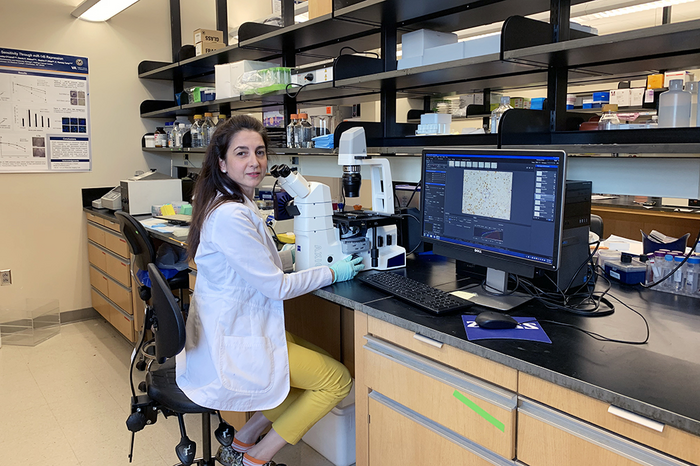When MUSC Hollings Cancer Center researcher Jezabel R. Blanco, Ph.D., began studying neurosciences, first as a graduate student and later as a postdoctoral fellow, her research was focused on understanding the mechanisms underlying brain disease, both in the context of neurodegeneration and cancer, but mostly from a basic research angle.

Credit: MUSC
When MUSC Hollings Cancer Center researcher Jezabel R. Blanco, Ph.D., began studying neurosciences, first as a graduate student and later as a postdoctoral fellow, her research was focused on understanding the mechanisms underlying brain disease, both in the context of neurodegeneration and cancer, but mostly from a basic research angle.
However, after she arrived at MUSC Darby Children’s Research Institute and Hollings Cancer Center as an assistant professor in 2020, she began working with the doctors who treat pediatric brain cancer patients and interacting with the families of some of these kids. She heard their stories of children with medulloblastoma, the cancer that she studies, and their firsthand accounts changed the way she thought about things.
“The toxicity that is linked to the treatment that they receive is terrible,” she said.
Further, because there is less research into pediatric cancers than adult cancers, most of the drugs used to treat medulloblastoma are decades old – the newest was developed in the late 1990s. Some of the others were approved back in the ‘60s and ‘70s, she said. And when patients relapse, doctors don’t have any further options for them. While the five-year survival rate for medulloblastoma is about 70%, for those kids who relapse, this number is close to zero. Unfortunately, she said, 30% of these children will relapse.
This has made Blanco determined to understand the biological mechanisms that cause relapse so that new drugs can be developed.
“We need to have better treatments for these kids. We need treatments to be more targeted so they will be less toxic and more effective,” she said.
She is already making progress.
Blanco recently learned that she was awarded a grant by the V Foundation for Cancer Research, only the second Hollings researcher to receive a grant from this organization. The V Foundation invites select cancer research institutions to apply for its annual grants, and each institution may nominate only one of its researchers each year.
The V Foundation funding will allow her to continue her research into the mechanisms behind medulloblastoma relapse – research that is featured this month in the journal Science Advances.
In her paper, Blanco focuses on patients in the Sonic hedgehog subgroup medulloblastoma. Medulloblastomas have been subdivided into four major subgroups based on transcriptional profile, and copy number aberrations, and the Sonic hedgehog subgroup represents about 30% of all medulloblastoma cases.
Efforts have been made to block the Sonic hedgehog signaling pathway by targeting the transmembrane protein SMO, or smoothened, which occurs upstream in the pathway. Many of the patients treated with compounds inhibiting SMO, however, have relapsed. Instead, Blanco’s research indicates that proteins farther along in the pathway, called GLI, or glioma-associated oncogene homolog, should be the ones targeted.
“If you use a GLI inhibitor instead of a SMO inhibitor, you will target a population of GLI dependent SOX2 cells that we have seen facilitates tumor relapse,” she said.
Research showed that using a GLI inhibitor didn’t just make the tumor smaller but also made it weaker, she said. The treated tumor, once transferred into the brain of another mouse, couldn’t reproduce itself and grow, while those exposed to drugs targeting SMO were extremely aggressive.
Now, with the funding from the V Foundation, she will anticipate any mechanism of resistance to GLI inhibitors and look for combination therapies to prevent their emergence.
“It’s well known that if you use a single therapeutic in the clinic that tumors find a way to escape treatment and grow again. So, we are looking for the best combination to translate the data to the clinic,” Blanco said.
Blanco said that what drives her is making a real-world difference for children.
“I would say that 95% of the time, research stays in the mouse room, and that’s it. So, you publish the data, and it won’t go to the clinic even though the data is good. My dream is to be able to translate my research to the clinic,” she said.
With about 350 new cases of medulloblastoma each year, this cancer is classified as a rare disease and doesn’t get as much attention as more common cancers. But to Blanco, that’s all the more reason to focus all of her energies on this research.
“There are a lot of cancer centers– they don’t really want to invest in people working on pediatric cancer. But MUSC Hollings does it,” she said. “The lives of those children matter to me, and they matter also to MUSC.”
Journal
Science Advances
Article Title
Noncanonical activation of GLI signaling in SOX2+ cells drives medulloblastoma relapse
Article Publication Date
20-Jul-2022




